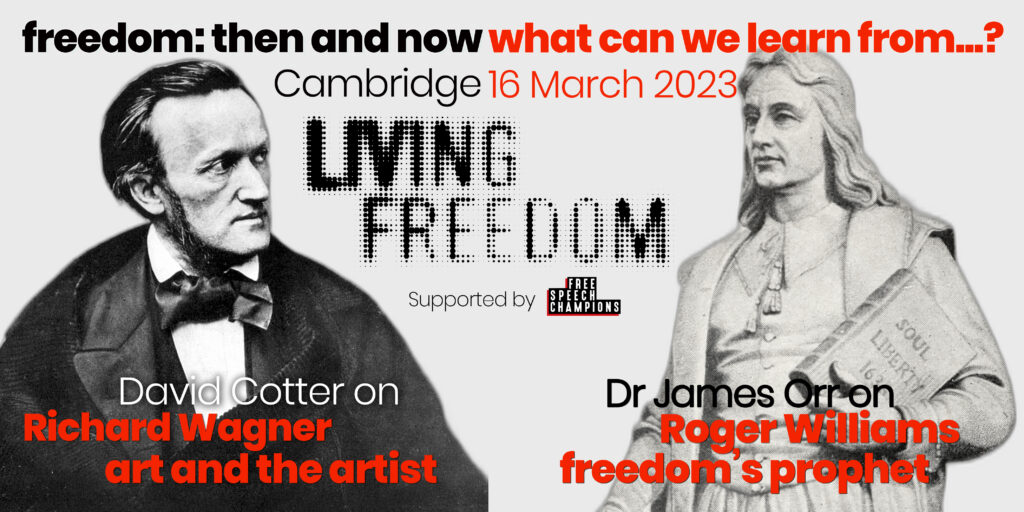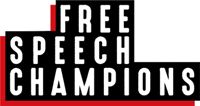
INTRODUCTION
‘What can we learn from…?’ events take as a starting point important thinkers and cultural figures from the past. They offer an opportunity to understand the emergence of key ideals related to freedom and to explore and debate if and how they remain important in the present.

Each salon starts with short, accessible talks from thought-provoking experts and critics who will offer insights into key thinkers in history. Talks are followed by plenty of time for discussion, with the chance to ask questions and put forward points. Together we will interrogate why these thinkers and the ideas they promoted can offer valuable insights that help us understand freedom then and now.
REGISTER
Space is limited. To reserve a place, please fill in the form below
EVENT
Thursday 16 March, 7.15pm-9.15pm
Historically freedom of conscience has been a staple of liberal society. Join us to explore the historic roots and contemporary realities of this important ideal.
1: Roger Williams: Freedom’s Prophet
Dr James Orr, assistant professor of philosophy of religion, University of Cambridge
Amidst the heady religious ferment of the seventeenth century in North America, Roger Williams – a minister, theologian, and alumnus of Pembroke College, Cambridge – soon emerged as a central figure in the brewing conflicts over freedom of religion and freedom of conscience. Expelled by Puritan leaders from the Massachusetts Bay Colony, Williams founded the Colony of Rhode Island with the express purpose of providing a space for the free expression of contested religious and political perspectives. A fierce and early critic of chattel slavery and the callous treatment of Native Americans, Williams sowed the seeds for the idea that the freedom to criticise authorities and majorities is an indispensable enabling condition for civic flourishing. A reappraisal of his legacy and work offers us an opportunity to assess and contest the many and various fetters on free expression that have emerged across our institutional landscape today.
2: Richard Wagner: Can we separate art from the artist?
David Cotter, academic, musician and writer
The work of Richard Wagner is captivating, but also challenging and unsettling. He believed art could be a unifying force for society. But like his operatic characters, Wagner often rejected social norms and his notoriously anti-Semitic views have promoted some critics and institutions to argue his music should no longer be played. Today, from writer JK Rowling to the recent award-winning film Tár, the beliefs, moral character or personality traits of artists are regularly asserted as key to judging the value of their work. But whatever an artists’ controversial or deeply unpleasant views, should we be more willing to focus on the work itself? Or can we never really separate art from the artist?
VENUE
Sidney Sussex College
Knox-Shaw Room
Sidney St, Cambridge CB2 3HU
See Google Maps for location.
SPEAKERS
DR JAMES ORR
assistant professor of philosophy of religion, University of Cambridge
James Orr is assistant professor of philosophy of religion at the University of Cambridge. He is Chairman of the Edmund Burke Foundation UK, a trustee of the St Paul’s Theological Centre and the Roger Scruton Legacy Foundation and a member of the Advisory Councils of the New Social Covenant Unit, the Free Speech Union, History Reclaimed, and Briefings for Britain.
DAVID COTTER
academic, musician and writer
David Cotter is an academic and musician who has performed and spoken in 22 countries around the world. David’s recent publications include ‘The Creative Musical Mediation of Order and Chaos’ in Jordan Peterson: Critical Responses and ‘The Guitar Reimagined’ (co-authored with Marc Estibeiro) in Rethinking the Musical Instrument. David has also written for The Critic. He is currently completing his doctorate on co-performer collaboration in musical performance.
CONVENORS
ALASTAIR DONALD, convenor, Living Freedom
DAVID COTTER, academic, musician and writer
CHARLIE BENTLEY-ASTOR, English undergraduate, freelance writer

